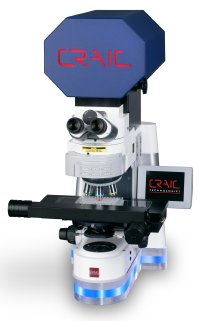CRAIC Technologies, the leading manufacturer of UV-visible-NIR microscopes and microspectrometers, is pleased to announce the 20/20 Solar microspectrophotometer. The 20/20 Solar instrument is designed to measure the thickness of thin films as well as the optical efficiencies and clarity of photovoltaic cells. This can be done by both transmission and reflectance whether the solar cells are the traditional crystalline silicon substrates or one of the thin film varieties. Even protective glasses and concentrator modules can be analyzed for their efficiency.
This powerful tool also has a host of other functions. It can be combined with CRAIC Technologies proprietary contamination imaging capabilities to locate and identify process contaminants. As such, the 20/20 Solar represents a major step forward in metrology instrumentation available to the photovoltaic industry.

"Many of our customers want to test the quality of photovoltaic devices for rapid quality control of their products. The 20/20 Solar microspectrophotometer was built in response to customer requests for a powerful, flexible metrology tool that can test a number of different aspects of many different photovoltaic devices" says Dr. Paul Martin, President. "This powerful tool is also multifunctional in that it can be configured to measure thin film thickness, analyze optical efficiencies and spectral characteristics of solar cells and their components, for locating and identifying contaminants in the production process and far more."
The complete 20/20 Solar solution combines advanced microspectroscopy with sophisticated software to enable the user to measure transmissivity, reflectivity, and luminescence. It will also be able to determine the thin film thickness by either transmission or reflectance of many types of materials and substrates. It can be used to measure the transmissivity and reflectivity from many of the components used to manufacture PV cells such as concentrators. Due to the flexibility of the CRAIC Technologies design, sampling areas can range from over 100 microns across to less than a micron. Designed for the production environment, it incorporates a number of easily modified metrology recipes, the ability to measure new films and materials as well as sophisticated tools for analyzing data as well as options for automation including touchscreen control. Other features such as contamination analysis are easily added to this instrument.